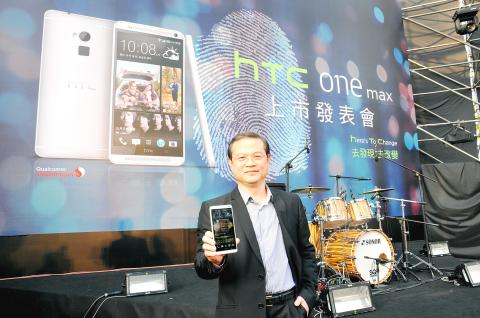Smartphone vendor HTC Corp (宏達電) yesterday said it has targeted China’s 10 most-populated cities to sell its latest One Max smartphone, which has a 5.9-inch display, in its effort to expand its Chinese market share to 20 percent.
HTC made the remarks before it launched its latest smartphone in Greater Kaohsiung yesterday.
The company said it had cleaned most of its inventories in China last quarter and that the company expected to see the One Max phablet boost sales this quarter.

Photo: Lee Chiu-ming, Taipei Times
“HTC will coorporate with Chinese telecom operators to sell its products in China’s big cities,” HTC’s Greater China operations head Jack Tong (董俊良) told reporters ahead of a product launch event.
HTC will work with China’s major mobile operators, including China Mobile Ltd (中國移動), to sell its One series flagship smartphones, Tong said.
“Then, we will gradually increase the number of our stores in second-tier cities,” Tong added.
HTC planned to increase the number of its Chinese stores to 4,000 next year from the current 3,000 stores in China’s first-tier cities, including Beijing, Chongqing and Shanghai.
HTC aims to grow its Chinese market share to 20 percent in competition with Chinese smartphone vendors, including Lenovo Group (聯想), ZTE Corp (中興), Huawei Technologies Co (華為) and Xiaomi Corp (小米), Tong said.
Leveno is the second-biggest smartphone maker in China with market share of 12.6 percent in the second quarter of this year, while ZTE and Huawei ranked No.4 and No.5 respectively, with market shares of 8.8 percent and 8.7 percent, according to IDC’s tally.
“We are determined and working hard to reach our goal,” Tong said.
HTC’s new One Max phablet will be available in Taiwan from next Wednesday at the price of NT$23,900 (US$814.68).
However, mobile users will have to pay only NT$8,990 for the phone by signing a two-year service contract with local telecoms at a monthly minimum fee of between NT$1,343 and NT$1,388, HTC said.
As One Max supports 4G LTE technology, Tong expects the phone will receive a boost from the upcoming launch of 4G services in China.
“We have seen the dawn and our hard work will pay off,” he said.
HTC’s One Max is equiped with Qualcomm Inc’s older-generation Snapdragon 600 1.7GHz quad-core processor, a less powerful processor than the Snapdragon 800 2.3GHz quad-core processor used in Samsung Electronics Co’s 5.7-inch Galaxy Note 3.
HTC also said that it aims to take at least a 50 percent share of Taiwan’s phablet market with the launch of its 5.9-inch HTC One Max, going head to head with Samsung Electronics Co’s Galaxy Note series.
The new phablet — a phone and tablet hybrid — will help HTC become the top phablet vendor in its home market, Tong said.
HTC’s shares closed up 0.76 percent at NT$133 in Taipei trading, underperforming the benchmark TAIEX, which gained 0.79 percent.
Additional reporting by CNA.

In Italy’s storied gold-making hubs, jewelers are reworking their designs to trim gold content as they race to blunt the effect of record prices and appeal to shoppers watching their budgets. Gold prices hit a record high on Thursday, surging near US$5,600 an ounce, more than double a year ago as geopolitical concerns and jitters over trade pushed investors toward the safe-haven asset. The rally is putting undue pressure on small artisans as they face mounting demands from customers, including international brands, to produce cheaper items, from signature pieces to wedding rings, according to interviews with four independent jewelers in Italy’s main

Japanese Prime Minister Sanae Takaichi has talked up the benefits of a weaker yen in a campaign speech, adopting a tone at odds with her finance ministry, which has refused to rule out any options to counter excessive foreign exchange volatility. Takaichi later softened her stance, saying she did not have a preference for the yen’s direction. “People say the weak yen is bad right now, but for export industries, it’s a major opportunity,” Takaichi said on Saturday at a rally for Liberal Democratic Party candidate Daishiro Yamagiwa in Kanagawa Prefecture ahead of a snap election on Sunday. “Whether it’s selling food or

CONCERNS: Tech companies investing in AI businesses that purchase their products have raised questions among investors that they are artificially propping up demand Nvidia Corp chief executive officer Jensen Huang (黃仁勳) on Saturday said that the company would be participating in OpenAI’s latest funding round, describing it as potentially “the largest investment we’ve ever made.” “We will invest a great deal of money,” Huang told reporters while visiting Taipei. “I believe in OpenAI. The work that they do is incredible. They’re one of the most consequential companies of our time.” Huang did not say exactly how much Nvidia might contribute, but described the investment as “huge.” “Let Sam announce how much he’s going to raise — it’s for him to decide,” Huang said, referring to OpenAI

The global server market is expected to grow 12.8 percent annually this year, with artificial intelligence (AI) servers projected to account for 16.5 percent, driven by continued investment in AI infrastructure by major cloud service providers (CSPs), market researcher TrendForce Corp (集邦科技) said yesterday. Global AI server shipments this year are expected to increase 28 percent year-on-year to more than 2.7 million units, driven by sustained demand from CSPs and government sovereign cloud projects, TrendForce analyst Frank Kung (龔明德) told the Taipei Times. Demand for GPU-based AI servers, including Nvidia Corp’s GB and Vera Rubin rack systems, is expected to remain high,